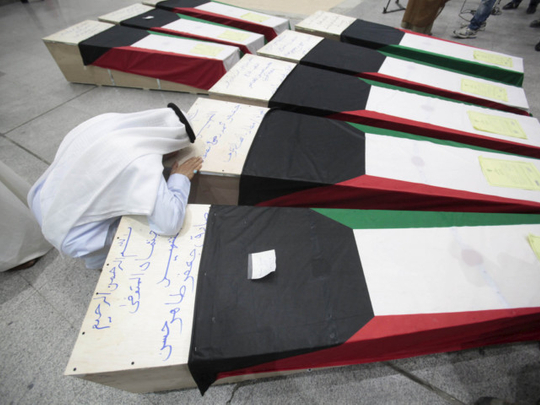
Dubai: Located near war zones, and where hatred and grudges are at boiling point several Gulf states have started feeling the heat; attacks on Shiite mosques in Kuwait and Saudi Arabia.
Analysts say that the recent upswing of violence did not emerge in a vacuum and there are a set of regional factors responsible for what is happening.
“Gulf states are located in a very dangerous area. We live next to a set of active volcanos both politically and militarily,” Emirati political scientist Abdul Khaleq Abdullah, told Gulf News.
The terrorist group Daesh has claimed a string of recent bombings in Saudi Arabia and most recently in Kuwait, targeting Shiite mosques. However, Daesh got its start in Iraq last year and quickly spread to Syria declaring a self-styled ‘Islamic’ state.
Daesh’s emergence in Iraq came at a time when former Iraqi Prime Minister Nouri Al Maliki was accused of marginalising Sunnis in the country. Many analysts attribute the quick spread of Daesh to Sunni desperation with the sectarian policies of the Iraqi government as well as Syrian president Bashar Al Assad’s crackdown on a mainly Sunni rebellion just across the border.
The recent attacks in the Gulf come against this backdrop.
“They are a reflection of the sectarian dispute which is mushrooming in the Arab world, coupled with feelings of hatred, revenge and grudges,” said Mohammad Abu Rumman, an Amman-based researcher and expert on extremist groups.
Abu Rumman added that religious leaders are playing a critical role in promoting the phenomenon.
“Daesh believes Shiites are infidels and their fighters are brainwashed to believe they will be closer to God if they kill Shiites,” he said.
On the other hand, analysts say, Sunnis are being also killed in mosques in Iraq after some Shiite religious leaders also claimed Sunnis as enemies.
“It is obvious that Daesh is seeking to fuel the Sunni-Shiite divide as well as Arab-Iranian tensions,” Abdul Aziz Saqr, chairman of the Saudi-based Gulf Research Centre told Gulf News.
The attack on a Shiite mosque in Kuwait on Friday aimed to exacerbate sectarian tension in the country, but according to Kuwaiti journalist Mona Fuzei, it had the opposite effect.
“Sunnis and Shiites united after the attack,” she said, pointing out they realised at the end they are all Kuwaiti citizens. “They fear the same source of danger.”
While some analysts believe a stronger security and intelligence cooperation is needed in the Gulf countries to face Daesh and other terrorist threats, other say a “package” of measures are equally needed.
Some of the measures are internal, including finding ways to deal with the ‘extremist’ religious speech, enlightening the youths’ minds with a moderate speech and tracing the supporters of terrorists group.
And some others related to the regional developments, including ending the policy of exclusion in countries such as Iraq and introducing democratic measures in hotspots, including Syria, and ending Iran interference in internal affairs in the Arab region.
“The solution is not an easy or a simple one,” said Abu Rumman. “The security aspect is necessary and needed, but a security solution without a political one is like, I believe, somebody who wants to fly with one wing.”










